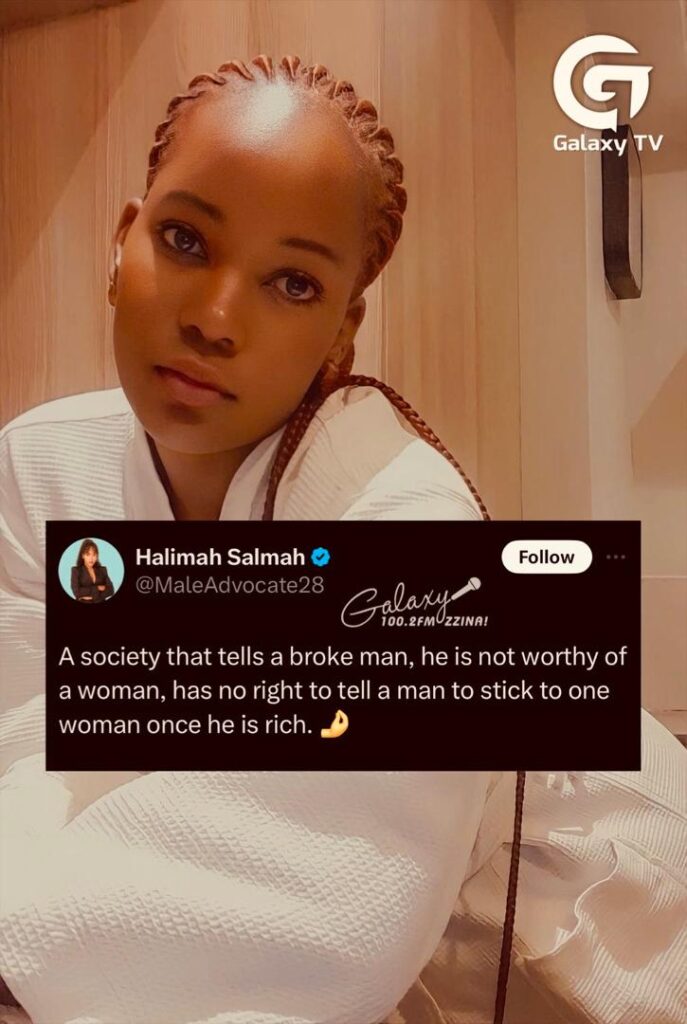On one chilly evening, when I was chilling with Morris, catching up and occasionally checking our phones, on a cup of coffee, I stumbled upon a screenshot of a viral post from Halimah Salmah.
The post read, “A society that tells a broke man, he is not worthy of a woman, has no right to tell a man to stick to one woman once he is rich.”
The group chat, which had been buzzing with activity, suddenly went numb. I couldn’t help but wonder what the previously vocal members were thinking.
Halimah’s post struck a chord, highlighting the hypocrisy in societal expectations. In Uganda, it’s common for men to have multiple partners, but when women cheat, it’s deemed unacceptable.
This double standard raises questions about the fairness of judging a man’s worth based on his financial situation. Why is it okay for men to have multiple partners, but when women do the same, they’re shamed?
The notion that broke men are unworthy of dating is often perpetuated by women. But what drives this thought process?
Is it the desire for financial security, or is it a deeper societal issue? In Africa, where economic struggles are prevalent, dating can be a costly venture.
However, should a man’s financial capabilities dictate his worth as a partner? Is it fair to expect men to provide for women without considering their own financial struggles?
It’s essential to examine the needs women expect men to fulfill. Are they mandatory, or are they societal constructs?
If a man cannot afford to meet these expectations, does he become unworthy of love and companionship?
Women often expect men to provide for their material needs, but what about emotional support? Is that not a two-way street?
Furthermore, the idea that men must provide for women reinforces harmful gender stereotypes. It perpetuates the notion that men are breadwinners, while women are dependent on them.
This mindset limits women’s agency and autonomy, reducing them to mere recipients of men’s provision.
Halimah’s post challenges us to rethink these expectations and the fairness of judging someone based on their financial situation.
It’s time to recognize that a person’s worth extends beyond their bank account.
We need to move away from materialistic expectations and focus on building meaningful connections based on mutual respect, trust, and communication.
In addition to challenging societal expectations, it’s essential to recognize the impact of these expectations on mental health.
The pressure to provide financially and meet materialistic demands can lead to extreme stress, anxiety, and depression.
This stress can affect not only the individual but also their loved ones, creating a ripple effect of mental health concerns within families.
The weight of these expectations can lead to feelings of inadequacy, low self-esteem, and burnout. Relationships can suffer as a result, with couples feeling trapped in a cycle of stress and resentment.
The longevity of relationships can be severely impacted, as the constant pressure to meet societal expectations can erode the foundation of trust, communication, and love.
As we work to break free from these harmful expectations, let’s also prioritize mental health and well-being. Let’s encourage open conversations about stress, anxiety, and depression.
Let’s support each other in building healthy relationships, free from the burdens of societal pressure.
In conclusion, I advise my readers to recognize the harm caused by societal expectations and to work towards creating a more inclusive, empathetic understanding of relationships.
Let’s value people, not paychecks, and prioritize mental health and well-being. By doing so, we can build stronger, more resilient relationships that thrive on mutual respect, trust, and love.

